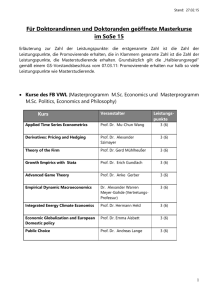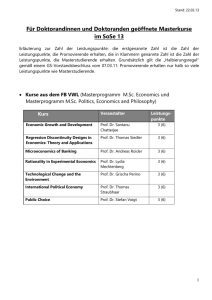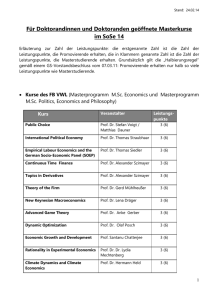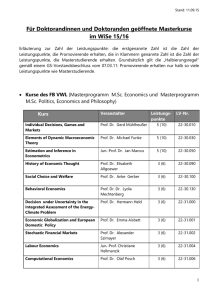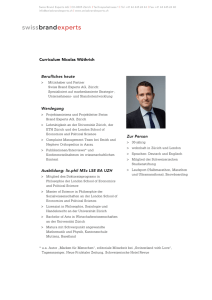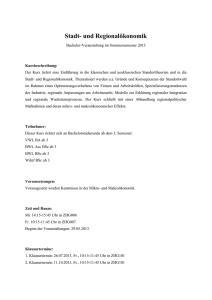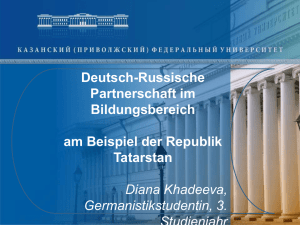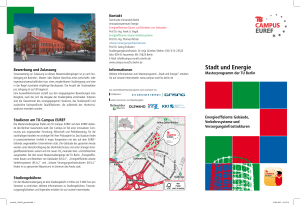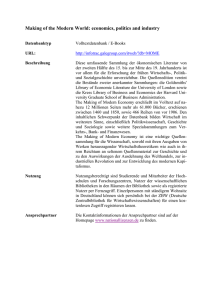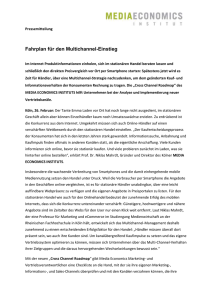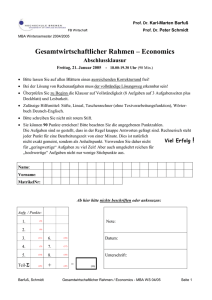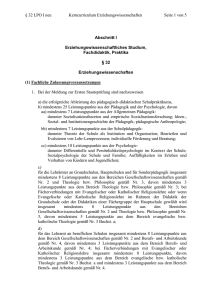Wintersemester 2014/2015
Werbung
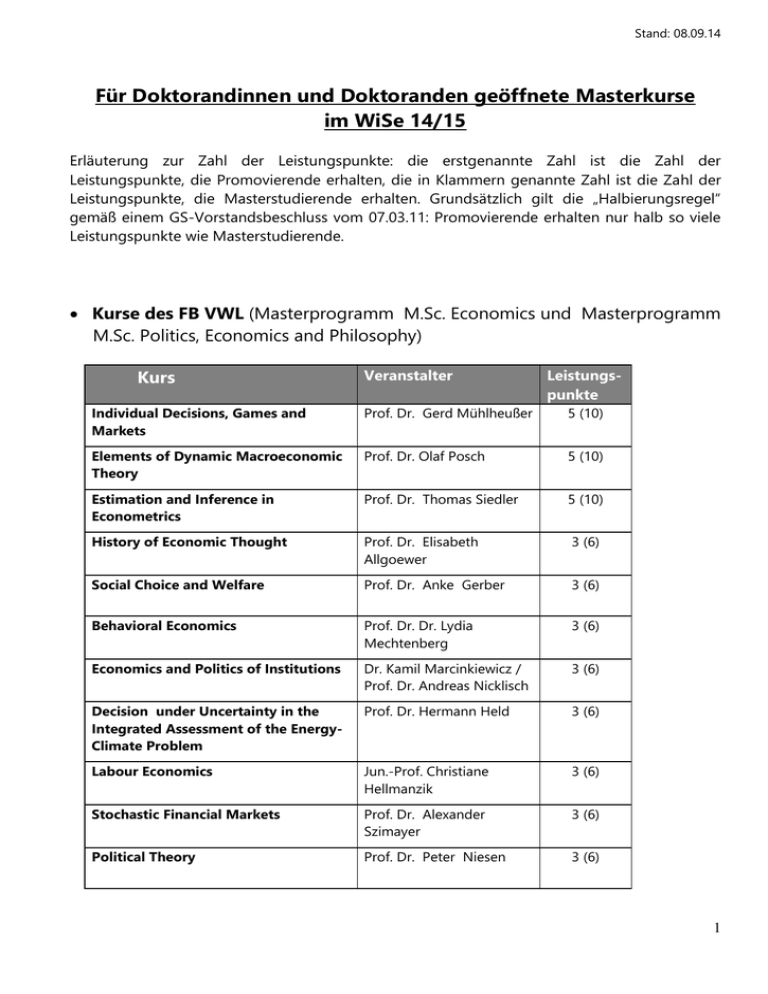
Stand: 08.09.14 Für Doktorandinnen und Doktoranden geöffnete Masterkurse im WiSe 14/15 Erläuterung zur Zahl der Leistungspunkte: die erstgenannte Zahl ist die Zahl der Leistungspunkte, die Promovierende erhalten, die in Klammern genannte Zahl ist die Zahl der Leistungspunkte, die Masterstudierende erhalten. Grundsätzlich gilt die „Halbierungsregel“ gemäß einem GS-Vorstandsbeschluss vom 07.03.11: Promovierende erhalten nur halb so viele Leistungspunkte wie Masterstudierende. Kurse des FB VWL (Masterprogramm M.Sc. Economics und Masterprogramm M.Sc. Politics, Economics and Philosophy) Kurs Veranstalter Leistungspunkte Individual Decisions, Games and Markets Prof. Dr. Gerd Mühlheußer 5 (10) Elements of Dynamic Macroeconomic Theory Prof. Dr. Olaf Posch 5 (10) Estimation and Inference in Econometrics Prof. Dr. Thomas Siedler 5 (10) History of Economic Thought Prof. Dr. Elisabeth Allgoewer 3 (6) Social Choice and Welfare Prof. Dr. Anke Gerber 3 (6) Behavioral Economics Prof. Dr. Dr. Lydia Mechtenberg 3 (6) Economics and Politics of Institutions Dr. Kamil Marcinkiewicz / Prof. Dr. Andreas Nicklisch 3 (6) Decision under Uncertainty in the Integrated Assessment of the EnergyClimate Problem Prof. Dr. Hermann Held 3 (6) Labour Economics Jun.-Prof. Christiane Hellmanzik 3 (6) Stochastic Financial Markets Prof. Dr. Alexander Szimayer 3 (6) Political Theory Prof. Dr. Peter Niesen 3 (6) 1 Kurse des FB Sozialwissenschaften (Masterprogramm M.A. Politik- wissenschaft, Masterprogramm M.A. Soziologie, Masterprogramm M.A. Internationale Kriminologie) Kurs Veranstalter Leistungspunkte Staat und Globalisierung: historische und systematische Perspektiven Prof. Dr. Olaf Asbach 3 (6) Rohstofffluch oder Rohstoffsegen? Prof. Dr. Cord Jakobeit 3 (6) Poltische Kulturen im internationalen Vergleich Dr. Jens Tenscher (Vertretungs-Professur) 3 (6) Critical Norms Research: Recent Debates Dr. Philip Liste (Vertretungs-Professur) 3 (6) Soziologie der Arbeit und Freizeit Prof. Dr. Jürgen Beyer 3 (6) Cultural Studies Prof. Dr. Alexander Geimer 3 (6) Wohlfahrtsstaaten zwischen Solidarität und Markt – Trends und soziale Folgen Prof. Dr. Birgit PfauEffinger 3 (6) Analysen zur Lebensqualität Dr. Stefanie Kley (Vertretungs-Professur) 3 (6) Strukturentdeckende Verfahren Dr. Stefanie Kley (Vertretungs-Professur) 3 (6) Die Materialität des Sozialen: ‚New Materialism‘ Prof. Dr. Urs Stäheli 3 (6) Rationalitäten des Rechts Prof. Dr. Susanne Krasmann 3 (6) 2 Kurse des FB Sozialökonomie (Masterprogramm M.A. Arbeit, Wirtschaft, Gesellschaft - Ökonomische und Soziologische Studien, Masterprogramm M.A. Europastudien, Masterprogramm M.A. International Business and Sustainability und Masterprogramm M.Sc. Health Economics and Health Care Management) Kurs Veranstalter Leistungspunkte Verhaltensökonomie Prof. Dr. Ralf Steinhauser 3 (6) Wirtschaftssoziologie Prof. Dr. Natascha Nisic 3 (6) Soziales Kapital im Wohlfahrtsstaat Prof. Dr. Petra Böhnke 3 (6) Coevolution of Markets and States Prof. Dr. Stefan Collignon 2 (4) The Eurocrisis, Monetary Policy and International Currency Issues Prof. Dr. Stefan Collignon 2 (4) Economic Governance or Government for the Euroarea? Prof. Dr. Stefan Collignon 2 (4) Germany’s Social Market Economy as a Model for Europe Prof. Dr. Stefan Collignon 2 (4) Gender Policy in the EU and in International Law Prof. Dr. Christa RandzioPlath 2 (4) Business and the Natural Environment Prof. Dr. Timo Busch 3 (6) Introduction to CSR: Grundlagen und aktuelle Probleme der Wirtschaftsund Unternehmensethik Prof. Dr. Dirk Ulrich Gilbert 3 (6) Internationales strategisches Management Prof. Dr. Dirk Ulrich Gilbert 3 (6) Economics of the Welfare State Prof. Dr. Mathias Kifmann 3 (6) Health Economics Prof. Dr. Mathias Kifmann 3 (6) WiSo-Graduate School, 08.09.14 3
